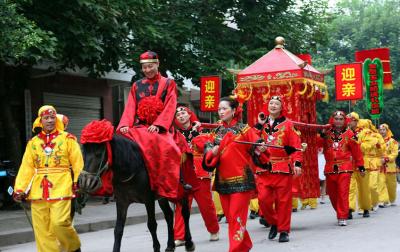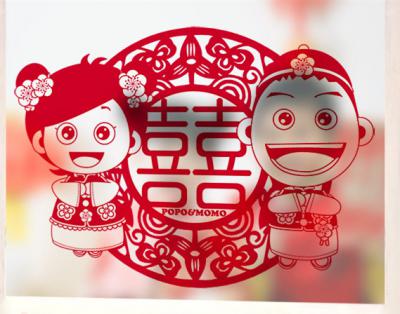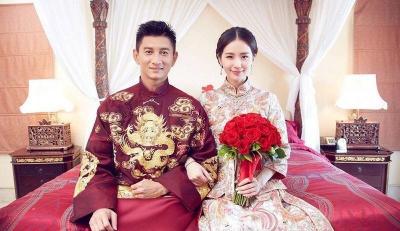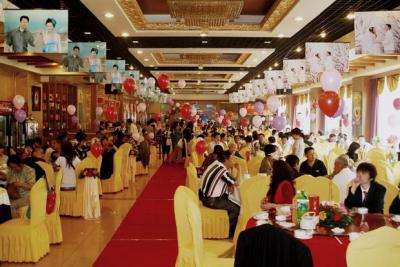Change of Chinese Views on Marriage
Many sociologists believe when a society develops steadily, the concept of marriage and love is relatively static, and when the society changes swiftly, the concept of marriage and love, as a sensitive indicator reflecting individual values, will also change drastically. After the founding of new China in 1949, some obsolete customs were abandoned. In the past 30 years, China has been undergoing a dramatic transition, which had a great impact on people's views on marriage and love, as well the growing Chinese culture.
Traditional marriage and love: there is no "love" but only "marriage"

Traditional marriage is heavily based on the so-called "parents' orders and matchmakers' introductions." The whole marriage is carried out under the command of others. Therefore, the traditional model of marriage and love leads to the fact that there is no such thing of "love" and only "marriage" between men and women of the two families. The love can only be fostered by the couple after marriage.
This phenomenon widely existed in the feudal society of China, and even in the early stage of New China (1950’s), these "arranged marriages" still occur in some remote rural areas.After painstaking efforts and persistent promotion, the abolition of arranged marriages made a large number of young men and women bravely choose their spouses freely, both in urban and rural areas, and then the blind date also gradually emerged, but there were some disadvantages in the blind date at that time:
1. Men and women don't really understand each other, they just go into a marriage based on the preliminary knowledge.
2. Marriage is a way to an affluent life or change of life.
3. Always follow the man you marry
4. The marriage of someone’s daughter is in trade for his son’s (exchange marriage), especially when the poor family can’t afford the marriage of the son.
The 1980s: the beginning of change towards marriage and love
After eliminating the negative impact of the Cultural Revolution, the state gradually got on the right track by focusing more on reform and opening up. Young people who have just emerged from the shadow of politicized marriage no longer worry about their family background, but the political status of a "party member" is still a halo. At that time, the living conditions were all harsh and difficult, income was not the most important thing. Those "honest, upright and kind hearted" men or women were always put on top list.

In matrimonial ads at that time, academic qualifications and occupations were more often mentioned. Not only men, but women also care about them, because academic qualifications and occupations represent his/her social status. In terms of occupation, writers, editors, scientists, technologists, and cadres are more favored by the opposite sex. The merits of men like "dedication to one’s work" and "self-motivation" were also often mentioned in the ads. The 1980s was the golden age of Chinese literary and artistic youth. Regardless of men and women, "loving literature" as a hobby was a bonus factor.
During the preparations of weddings, newlyweds were pursuing televisions, washing machines, and refrigerators at home as the standard of a decent wedding, while the former generations in 1970’s only asked for the bicycle, sewing machine, and wrist watch. In that period of welfare housing allocation, "housing" is also a favorable factor in the marriage market.At that time, Chinese people paid much attention to marital status and marriage experience, which means both men and women preferred their spouses in first marriage, This is still affected by the traditional culture, like the old value orientations: "being faithful to one’s husband unto death", and “growing old as one couple together".
Generally speaking, before1980s, people did expect a stable and long-term marriage, and tended not to divorce even there existed a big problem between the couple. The enactment of the second version "Marriage Law" in 1980, specified clearly for the first time that a couple could divorce if they "broke up". This was a big step forward for Chinese society.
1990s: Materialism emerging
When choosing a spouse in the 1990s, more young people attached importance to the economic factors of each other's families. Men with superior financial advantages tend to require their wives to be young and beautiful. At that time, money and economic conditions are recognized as the indispensable basis for marriage, while biologically determined way of mate selection was no longer criticized by the media and society. People turned more open-minded towards love and marriage.In the 1990s, as the market economy was adopted, more and more private businesses mushroomed in this country, the gap between the rich and the poor gradually formed, and economic conditions occupies an important position in China's concept of mate selection. Unlike the vague requirements in the 1980s, such as hoping for the other half to be "professional" and "motivated", in the marriage ads of 1990s, women more hoped that the other party was a "company manager", "better off", "returned students studying abroad", and others, who can provide direct economic benefits.
Therefore, consideration of economic orientation played an important role in selecting a spouse in the 1990s. At the same time, many young people also began to value the inner qualities of his/her future spouse, as well as the relations, interests, hobbies and personalities.
After 2000: more diversified opinions towards marriage and love
There is no universal standard for marriage in this era, the old standard has been broken, and the new one has not yet been established, and it would possibly never form due to the current diversified society. Even though there is a saying of "I would rather cry in a BMW than laugh on a bicycle" from certain type of girls, many other young people are willing to choose "naked marriage." – meaning the couple will get married without buying an apartment, car or even holding a ceremony.The development of modern communication technology like messengers, APPs, etc. delivered tons of opportunities for younger generations to communicate with each others, and the space distance has become closer, but this has never made marriage easier, the discriminatory term of "leftover man and woman" were even jokingly created for unmarried men and women over 30.Single young men and women have to rely more on modern means to find the other half, such as online dating, TV dating shows, and even the new tendency spawned a prosperous business in China – matrimonial and matchmaking websites. Especially after 2005, traditional marriage advertisements were no longer popular. Instead, online matrimonial ads have been adopted, and marriage/matchmaking websites like Jiayuan and Baihe have emerged as the top companies in the field.
After entering the new millennium, people (especially men) feel more pressure to buy an apartment and get ready for their marriage due to the quick rise of property rate. Hence, there was an ironic term for the phenomenon: “Mother-in-law Economy”, meaning that the mother-in-law tends to request her future son-in-law to purchase an apartment for the newlyweds before their wedding, which is regarded as the basis of a happy marriage. This practice helped push the real estate price go higher in the past years. On the other hand, a great number of young people in the cities focus more on the intimate relationship between the couple themselves. Many of them came from smaller towns or village and moved to big cities to secure a job, seizing any possible opportunity to develop their careers with his/her beloved. They and their marriages are relatively less affected by their parents living far from where they live and work.
At the beginning of the new millennium, people can also notice some advancement on the matrimonial ads, in which more girls mention they expect their mates to be humorous, easy-going, love sports and travel. This represents the importance of healthy and romantic relationship for a couple.
After 2010, New trends for Chinese marriage and relationship patterns
The traditional marriage pattern of "superior male and inferior female" has changed, while more and more couples of the other way (superior female and inferior male) went into marriage, the number has been considerably rising. This is a new trend in current young people's marriage and relationship pattern, and the phenomena of trial marriage, prenuptial contract and property notarization have increased.

With the development of economy, Chinese, especially the younger generations can lead a much better life than their parents. Their concepts of consumptions and saving, marriage and family have all been changed. "Flash marriages/divorces" is the translation of a Chinese term that originated in the early 21st century to describe a marriage between partners who wed after knowing one another for less than 7 months, and divorce in a short time after marriage. It happens more and more often among young people. And "trial marriages" is also a choice for them to pursue their ideal marriages. Fast change of matrimonial concepts has led to increasingly prominent intergenerational conflicts in traditional Chinese families. On the other hand, the importance of economic conditions in the factors of young people's spouse selection has increased, and property notarization has to be a solution for the couples to prevent the risks of marriage in some wealthy families.In the new era, younger generations tend to get married late, the phenomena of “parents forced marriage” and “leftover women” have caused young people “marriage anxiety”. This has also become a hot issue for sociologists and scholars.
Accompanied by "marriage anxiety" is the increasing proportion of single males and females who are supposed to get married in the eyes of their parents, and the "stay-single" situation of young generations has aroused wide social concern. The situation is worse in big cities such as Beijing and Shanghai, where there are a huge number of "leftover women and men". Parents in their fifties and sixties often complaint about their children’s unwillingness to marry. That is why the matchmaking corners emerged in those cities, where the parents can exchange information and seek the potential spouse for their children.
>> Recommended 11 Days Real China Discovery Tour to visit a blind-dating corner at a Chengdu’s park to see how Chinese parents seek future son/daughter-in-law for their marriage-age son and daughter.
Further reading:
